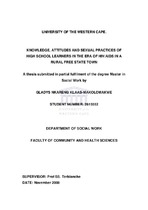| dc.contributor.advisor | Terblanche, Susan S. | |
| dc.contributor.author | Makolomakwe, Gladys Nkareng Klaas | |
| dc.date.accessioned | 2014-06-20T11:50:09Z | |
| dc.date.available | 2014-06-20T11:50:09Z | |
| dc.date.issued | 2009 | |
| dc.identifier.uri | http://hdl.handle.net/11394/3393 | |
| dc.description | Magister Artium (Social Work) - MA(SW) | en_US |
| dc.description.abstract | The HIV/AIDS pandemic with its tremendous impact has been a major cause of death and disruption of people’s lives. The youth of South Africa continues to be the most at risk and vulnerable by both being affected and infected by HIV/AIDS. There are non-conclusive research about the relationship between knowledge and behaviour of the youth in relation to HIV/AIDS. The goal of this research was to quantitatively explore the knowledge, attitudes and sexual practices of high school learners in the era of HIV/AIDS in a rural Free State town.The objectives of the study were to: • Explore the knowledge levels, attitudes and sexual practices of high school learners at a selected rural town;• Establish whether there is a difference in knowledge levels and sexual behaviour pattern of learners according to age at first sex; • Establish whether there is an association between knowledge levels and sexual behaviours; and • Explore problems experienced by participants when seeking information or help and what their suggestions are on prevention strategies.A total of 462 high school learners who were enrolled for grades 9, 10 and 11 in 2007 were selected to take part in the study. A self constructed questionnaire that also included open-ended questions for qualitative exploration was used to collect data. A total of 303 respondents responded.The SPSS programme was used for data analysis and open questions were analysed thematically. Measures were employed to ensure a form of face validity and reliability of the questionnaire. Results indicated poor knowledge levels of HIV/AIDS and positive attitudes towards people infected by HIV/AIDS. Teenagers’ sexual practices are rife but the majority of sexually active respondents have reported the use of condoms at first sex and last occasion of sex. Based on reported negative experiences at clinics, parental homes and schools regarding sexual health promotion and knowledge sharing, robust engagement of community leaders and elders working together with teenagers in programmes designed to enhance HIV/AIDS education is recommended. | en_US |
| dc.language.iso | en | en_US |
| dc.subject | Attitudes | en_US |
| dc.subject | HIV/AIDS | en_US |
| dc.subject | Knowledge | en_US |
| dc.subject | Sexual practices | en_US |
| dc.title | Knowledge, attitudes and sexual practices of high school learners in the era of hiv/aids in a rural Free State town | en_US |
| dc.type | Thesis | en_US |

